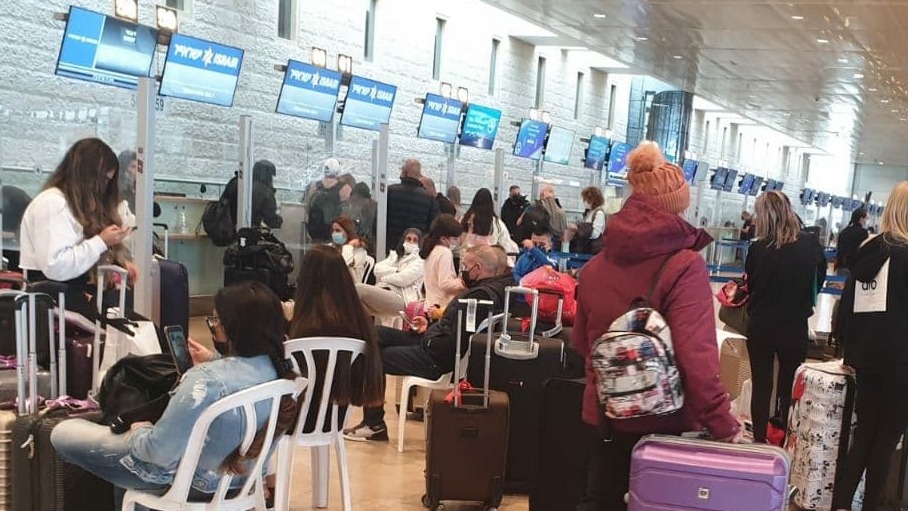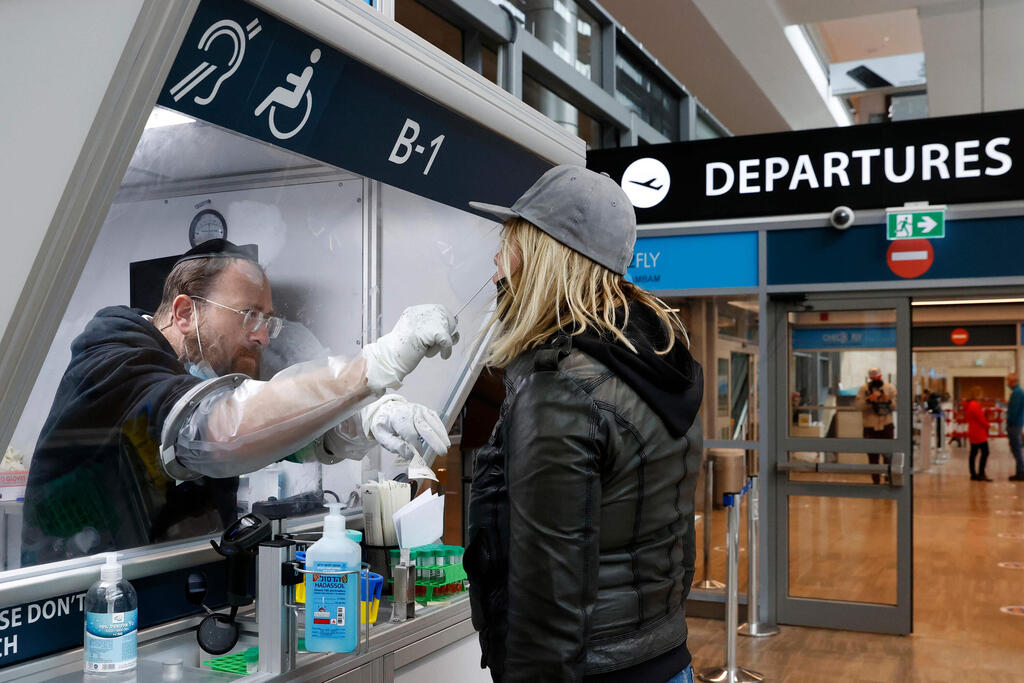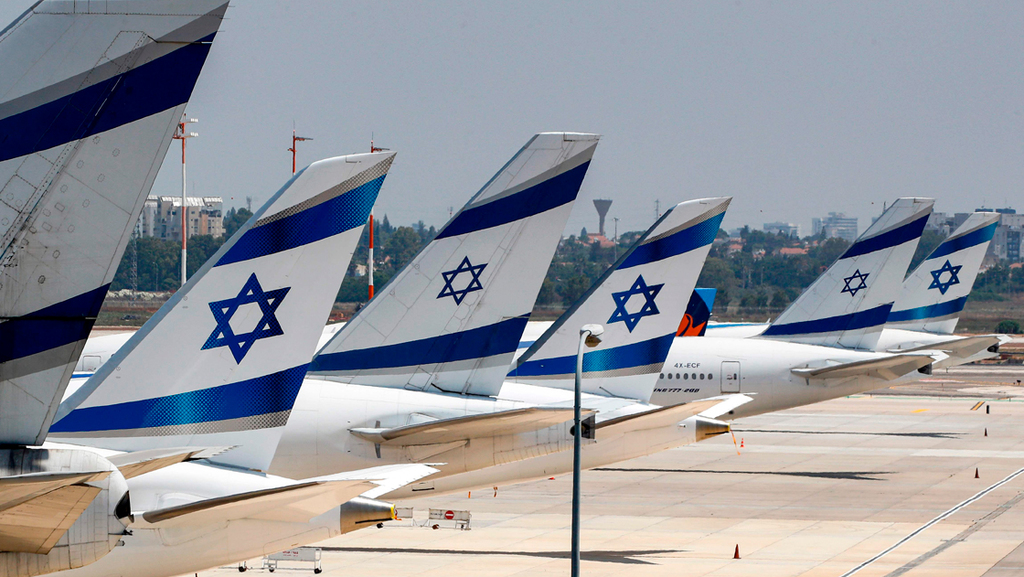Anyone hoping that 2021 would provide a rebound for air travel and tourism to the Middle East should disavow themselves of their optimism, travel analysts warn.
Early figures and data show that flight tickets issued for travel to the region in the coming months are merely a fraction of what they were last year, mainly due to ongoing government restrictions and quarantine measures that are in place due to the COVID-19 pandemic.
4 View gallery


Israelis check in at Ben-Gurion Airport for a flight to Dubai before the skies were closed due to the pandemic
(Photo: Itay Blumenthal)
In fact, Olivier Ponti, VP Insights at global travel analytics company ForwardKeys, says that the outlook for the region is “dismal.”
“As of February 9 [the latest available data], flight tickets issued for travel to the region in the coming six months are just 19% of what they were at the same moment a year ago,” Ponti says.
“The best performing major destinations are currently doing only marginally better. Bookings to the [United Arab Emirates] are just 22%, to Qatar are just 20% and to Egypt are just 23%.”
According to Ponti, Russia is proving to be the most resilient source market so far, with current bookings from there to destinations in the Middle East reaching 63% of last year’s level.
4 View gallery


A resort in the Sinai city of Sharm el-Sheikh. Egypt is proving popular with Russian travelers despite the pandemic
(Photo: Getty Images)
One of the more popular destinations for Russian travelers is Egypt; bookings to that country are 14% ahead of where they were in the second week of February 2020.
“The main obstacles to travel are government-imposed restrictions, which have been implemented in response to the pandemic, particularly quarantine,” Ponti says.
He says that the ever-changing restrictions were proving to be a deterrent to many tourists who are nervous that their plans could be derailed at the last minute.
Despite this, Ponti believes that vaccination campaigns will eventually have a positive impact on the global travel industry.
“As it will take well over a year to vaccinate the majority of people on the planet, I expect we will have to live with pre-flight testing for a longer period than most people expect,” he says.
Larger carriers, such as Emirates and Qatar Airways, will focus on driving traffic through to their respective hub airports in order to serve markets that are open to tourists.
Others, especially low-cost brands, will attempt to bring their business back to pre-COVID-19 levels. However, the success of these efforts will largely depend on the relaxation of travel restrictions.
4 View gallery


A traveler takes a coronavirus test at Ben-Gurion Airport before the skies were closed
(Photo: AFP)
“The single biggest obstacle facing air travel presently is the ever-changing nature of travel restrictions,” says Gus Gardner, travel and tourism analyst at GlobalData.
“Airlines and airports will now be facing a situation with lower cash reserves than last year and this will make survivability even tougher.”
To add to the complications, the emergence of new virus variants has not only highlighted how quickly the situation can change but has also significantly dampened consumer confidence.
Furthermore, while the vaccine rollout has provided a silver lining in this otherwise bleak picture, many countries are not vaccinating as quickly as was hoped and this could lead to a “fragmented recovery.”
“As a result, some destinations may see stronger recovery this year whilst others continue to struggle,” Garner says.
Some countries are already looking into implementing the use of vaccine passports for travel purposes.
In Israel, for example, the Transportation Ministry is seeking to restrict travel for unvaccinated Israelis as part of wider plans to reopen Ben-Gurion Airport, which is currently mostly shuttered.
Channel 12 News reported that anyone who had not received the jab would be required to apply for special permission to fly unless the travel was deemed to be “essential.”
4 View gallery


Planes belonging to Israeli national carrier El Al are parked at Ben-Gurion Airport last year after a suspension of international flights
(Photo: AFP)
Ministers also approved capping the number of people allowed to enter the country via air on a daily basis to 2,000.
The Health and Justice ministries are further working to amend public health legislation to enable the details of unvaccinated people to be shared with the local authorities, in an effort to boost the nationwide inoculation campaign.
Such policies could be viewed as discriminatory and problematic in terms of protecting consumer privacy as many travelers may be unwilling to share their personal health data with airlines, Gardner says.
“It is yet to be seen if having the vaccine will become a requirement to travel and the impact of these policies is currently unknown,” he says.
Government restrictions notwithstanding, many airlines are keen to vaccinate their crews – who regularly come into contact with hundreds of passengers – as quickly as possible.
Abu Dhabi-based carrier Etihad Airways recently made headlines for being the first to vaccinate all of its pilots and onboard crew; likewise, Israel’s national carrier El Al became the first airline in the world to vaccinate its entire customer-facing staff.
Article reprinted with permission from The Media Line

